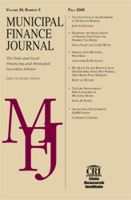Fiscal Illusions and Municipal Enterprises
Author: Theodore J. Stumm.
Source: Volume 20, Number 04, Winter 2000 , pp.61-71(11)

< previous article |next article > |return to table of contents
Abstract:
Public administration professor Theodore J. Stumm contends that citizens are misled in estimating the cost of public goods and services when municipal enterprise revenues are transferred to support non-enterprise programs—by earning revenue in enterprise funds and transferring it to other, largely non-enterprise city funds for expenditure, cities separate the earning and spending functions pertaining to their municipal enterprise activities, creating fiscal illusions for their taxpayers. This study shows how cities’ municipal enterprise activities, because of required accounting and reporting methodology for their fiscal activities, foster fiscal illusion, and uses data from a national survey of cities to determine the extent of the fiscal illusion that occurs. Further, the study tests DiLorenzo’s (1982) hypothesis that subsidization by municipal enterprises and the resultant fiscal illusion results in increased municipal spending.Keywords: Public sector growth; net revenue transfers; payments in lieu of taxes; franchise fees
Affiliations:
1: University of North Florida.